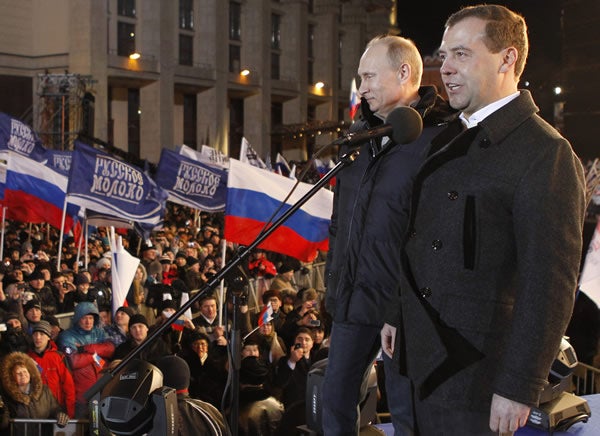Russian Elections Did Not Bring a Surprise–but Now What?
Michaela Dodge /
A recent Heritage event analyzed Russia’s presidential election and Prime Minister Vladimir Putin’s return to the presidency. The election was held in the aftermath of mass protests against Russian leadership’s corruption and disregard for the rule of law.
According to David Kramer, President of Freedom House, Putin already lost in three ways: 1) by losing his claim to legitimacy, apparent from the mass scale of protests as well as a failure to secure a majority in the recent Duma elections; 2) because the fear that allowed Putin to continue his authoritarian policy is diminishing; and 3) by losing his aura of political invincibility. All these factors make Putin dependent on creating a myth of an outside (U.S.) threat to justify his hardline ways. From the December–February mass demonstrations in Russia, however, it is clear that the Russians are tired of the prevailing corruption that Putin allowed to flourish.
According to Vladimir Kara-Murza, Washington bureau chief for RTVi television network, the current protests are even more significant than those in the early 1990s. This is because while in the 1990s Russian people protested against poor economic conditions in the country, today they demand rule of law.
The regime’s reaction—further limiting political freedoms—has to eventually cause enough resistance to effectively end Putin’s rule, Kara-Murza said. The opposition tried to maximize the turnout and deface as many ballots as possible or vote for a non-Putin candidate. Election observers report heavy manipulation in Putin’s favor, especially with regard to the overall framework of the campaign, which prevented a fair competition of the opposition parties.
Donald Jensen, senior fellow at the Center for Transatlantic Relations of the School of Advanced International Studies at Johns Hopkins University, was less optimistic regarding an early Putin demise. While there is no question about the outcome of the elections, he said, the important question is what will come next and how long Putin will last.
Russia’s current system is brittle and unstable. Moscow’s elite were waging an elaborate Internet campaign aimed at influencing a large bloc of middle-class undecided voters. For the first time since Putin came into power, the oligarchy that was traditionally supportive of him is willing to think about the world without Putin.
Heritage’s Ariel Cohen emphasized thatRussia’s very own future is at stake. While Putin would like to tighten his grip, thousands of protesters demand greater freedom. If Russia’s structural problems are not addressed, Russia will either stagnate or eventually descend into a bloody revolt just like in 1905 and 1917. Putin can either reform or face the ire of the people come next election—or sooner.
The United States can encourage the rule of law in Russia by adopting the bipartisan Sergey Magnitsky Rule of Law Accountability Act, which would ban most corrupt foreign officials from entering the United States and allow their ill-gotten property to be seized and confiscated by U.S. courts. Yet, Putin’s victory and his anti-American stance indicates that the Russian “reset” policy promoted by the Obama Administration, which bet on a relationship with Dmitry Medvedev, is going nowhere fast.
Click here to view this post in Spanish at Libertad.org.

